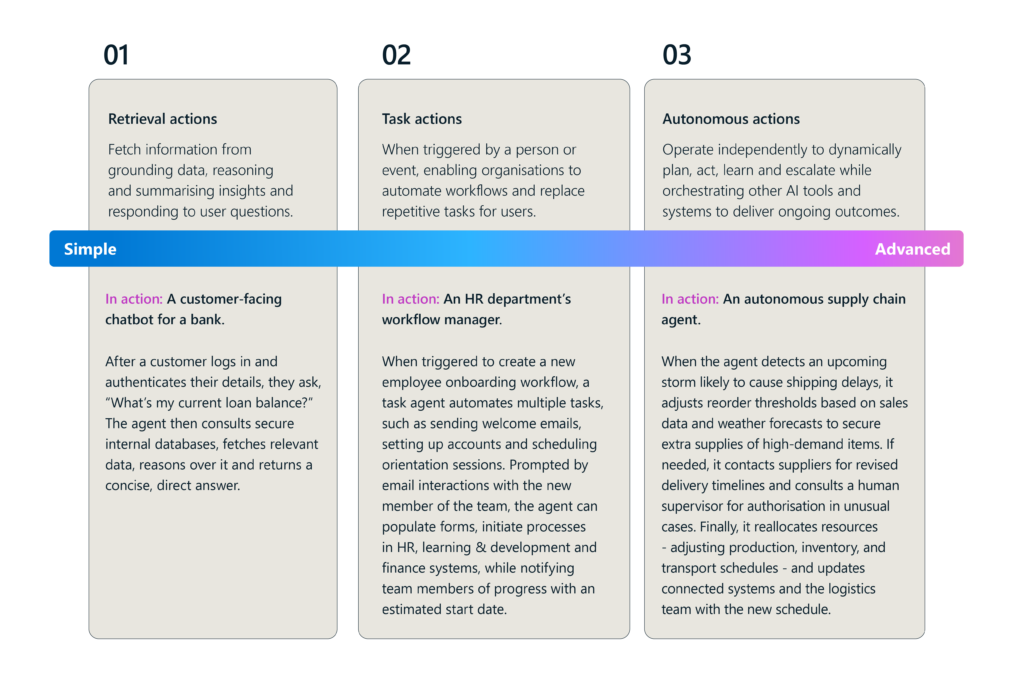

New research from Microsoft has found that businesses and public sector organisations with clear AI strategies are significantly outperforming those without.
The study, led by Dr Chris Brauer at Goldsmiths, University of London, reveals that the highest performing businesses and most productive public sector organisations have a clear AI strategy in place and are preparing for the next wave of the technology – agentic AI.
However, the report describes an ‘AI divide’ emerging within the UK economy. Whilst half of organisations have a clear AI strategy and the skills to implement it, a similar proportion do not, which is a lost opportunity to boost economic growth and improve public services across the UK.
The research, which is based on surveys with 1,480 UK senior leaders across public and private sectors, as well as 1,440 UK employees, found that more than half (54%) of leaders report that their organisation still lacks any formal AI strategy. Just 45% say their organisation understands the AI skills their workforce needs to be successful today, and half (50%) describe a gap between AI ambition and action within their organisations.
The AI divide extends to the UK workforce, with more than half (57%) of leaders reporting a widening gap in efficiency and productivity between workers who use AI and those that do not. More than a third (36%) of leaders go further to say that frequent AI users are more likely to be recognised or promoted in their organisation today.
These findings come at a time of severe workload pressure facing the UK’s workforce. More than half of UK employees (52%) and leaders (60%) say they are currently expected to do more work than a single person’s job. For a considerable proportion, the challenge is even more extreme, with 36% of leaders and 25% of employees stating that their workloads are the equivalent to doing at least two people’s jobs at the same time.
With leaders and employees facing substantial workload strains, respondents identified an urgent demand for agentic AI technologies to be deployed across the private and public sectors to take on some of the workload, overcome barriers to productivity and unlock growth. Despite this technology being relatively new, almost three quarters (72%) of leaders expect AI agents to be fully integrated across their operations, delivering significant value, with 21% anticipating this to be within the next 12 months, and 39% within two years.
Darren Hardman, CEO, Microsoft UK, said “The scope and scale of the government’s AI Opportunities Action Plan is an important foundation to drive growth, create jobs and improve living standards for all. Agentic AI can play a key role in removing digital drudgery, giving workers the opportunity to spend more time on creative and value adding tasks. At Microsoft, we’re helping to build an AI economy, investing in digital skills and tackling the AI divide, all pre-requisites to driving AI fuelled economic growth for the UK.”
Agentic AI covers a range of virtual tools – or ‘agents’ – from simple chatbots that retrieve information and answer questions; tools like Copilots which automate tasks and workflows; through to fully autonomous systems that learn, plan, and act with minimal human input.
Secretary of State Peter Kyle said “AI is transforming how we work. Through our AI Opportunities Action Plan, this government is backing businesses and workers to harness AI’s full potential – helping us unleash AI to improve public services and grow the economy as part of our Plan for Change. Agents will play a key role in this transformation, enabling organisations to work smarter, not harder. With over half of business leaders seeing a growing productivity gap between AI users and those yet to harness the technology, accelerating adoption is crucial. This report offers valuable insights for businesses ready to seize the moment.”
The research explores the specific opportunities for agentic AI that leaders hope to capitalise on within their organisations, from making efficiency and productivity gains to better risk forecasting and fraud prevention.
The Microsoft report, entitled Agents of Change, shares practical guidance to business and public sector leaders, proposing a Blueprint for Agentic Success based on the data insights from this in-depth study.
Dr Chris Brauer, Director of Innovation at Goldsmiths, University of London, advises: “Every organisation’s AI journey is unique. Agentic AI has the potential to revolutionise operations, increase resilience, and free employees from many routine tasks – if organisations are front footed. There are steps high-, medium-, and low-performing organisations in both the public and private sectors can take today – and this report sets out the blueprint to do just that.”
Three core agentic AI actions
